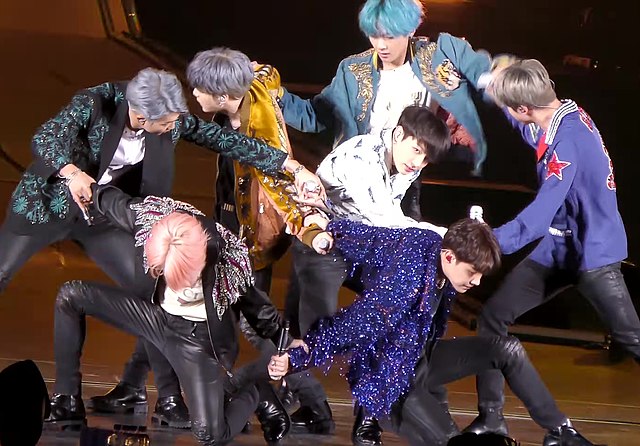New to K-entertainment? Welcome, and please stick around for awhile
Korean pop group, BTS became a worldwide phenomenon after their debut in 2013. The photo pictures the group performing “DNA” during their world tour in 2019.
November 18, 2021
I became a BTS fan in 2016, when K-pop was still fairly new to America. Back then, some people looked down on K-pop, so like many fans, I made separate social media accounts to interact with these celebrities.
It wasn’t always easy being a K-pop fan at school. For instance, to a K-pop fan, photocards are their prized possessions. They are small pictures of idols that come in the majority of albums. In middle school, I kept one in my phone case since some of them are very valuable and rare. Someone commented on it, saying that it was creepy to keep a picture of someone who I did not know.
The irony of this was that many people, even those who are not fans of K-pop, now do the same thing, just for the aesthetic.
Lately, though, students at Baldwin High School and the rest of the country have caught on to the recent rise of South Korean media. BTS’ global fan base has grown rapidly, making them one of the most famous bands in the world, and regardless of the cultural barriers, and many students have watched Squid Game or have seen Korean artists advertising products.
K-entertainment recently has become a significant part of American entertainment, from BTS being featured on Saturday Night Live to the psychological thriller Parasite winning the 2020 Academy Award for best picture.
Some of us, though, have been familiar with Korean entertainment long before this moment. K-entertainment, though new to some, has been consumed by others in the West for decades.
This especially applies to Asian students, who are happy to see K-pop or K-dramas as Asian representation in media.
Of course, as a Nepali-American, I feel proud of the success that BTS and other groups have achieved and how it has changed people’s views. It is upsetting, though, to see that many of the same celebrities who used to make fun of the band are now using their music for fame, with some influencers claiming to be K-pop fans by using their music or complimenting them to gather more fans.
Asian representation in American media has created an environment of inclusion and unity. It brings interest in a culture that some people are not yet familiar with, encouraging them to stay open-minded.
I’ve also noticed that it brings attention to Asian entertainment as a whole. Since Korean shows have left a good impression, fans have started turning to Japanese or Thai shows for similar plots.
With this rise of fame, though, my hope is that Asian culture will not just be seen as another passing trend in American entertainment. This already happened once earlier, when Psy’s “Gangnam Style” became a huge hit a decade ago, but then was seen as just an unusual novelty song.
Asian pop culture offers innovative movies, TV series, and pop songs, and fans who stick around will find a lot to enjoy. In addition to the many options that Korean entertainment provides, many other Asian countries have a variety of options to choose from.






